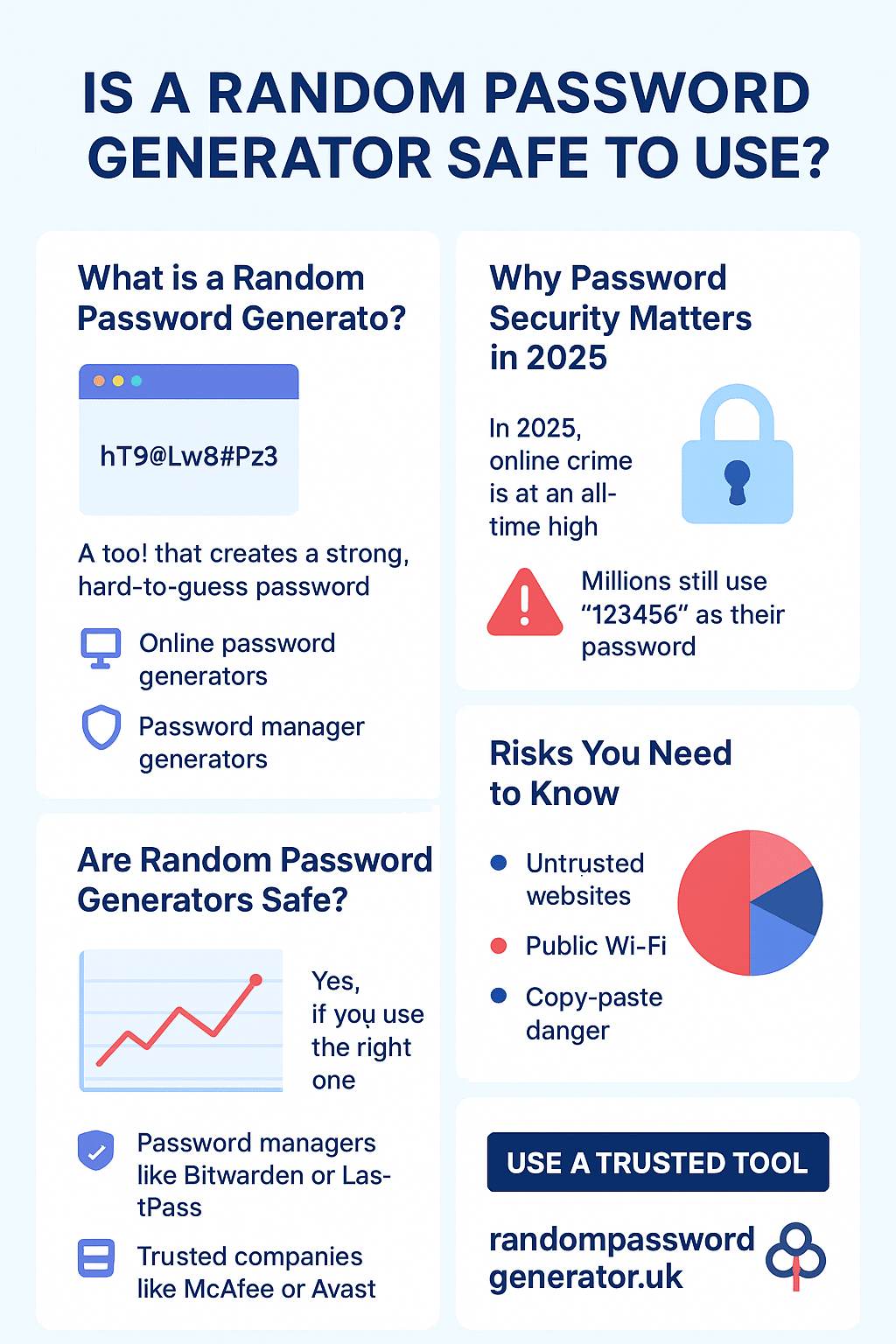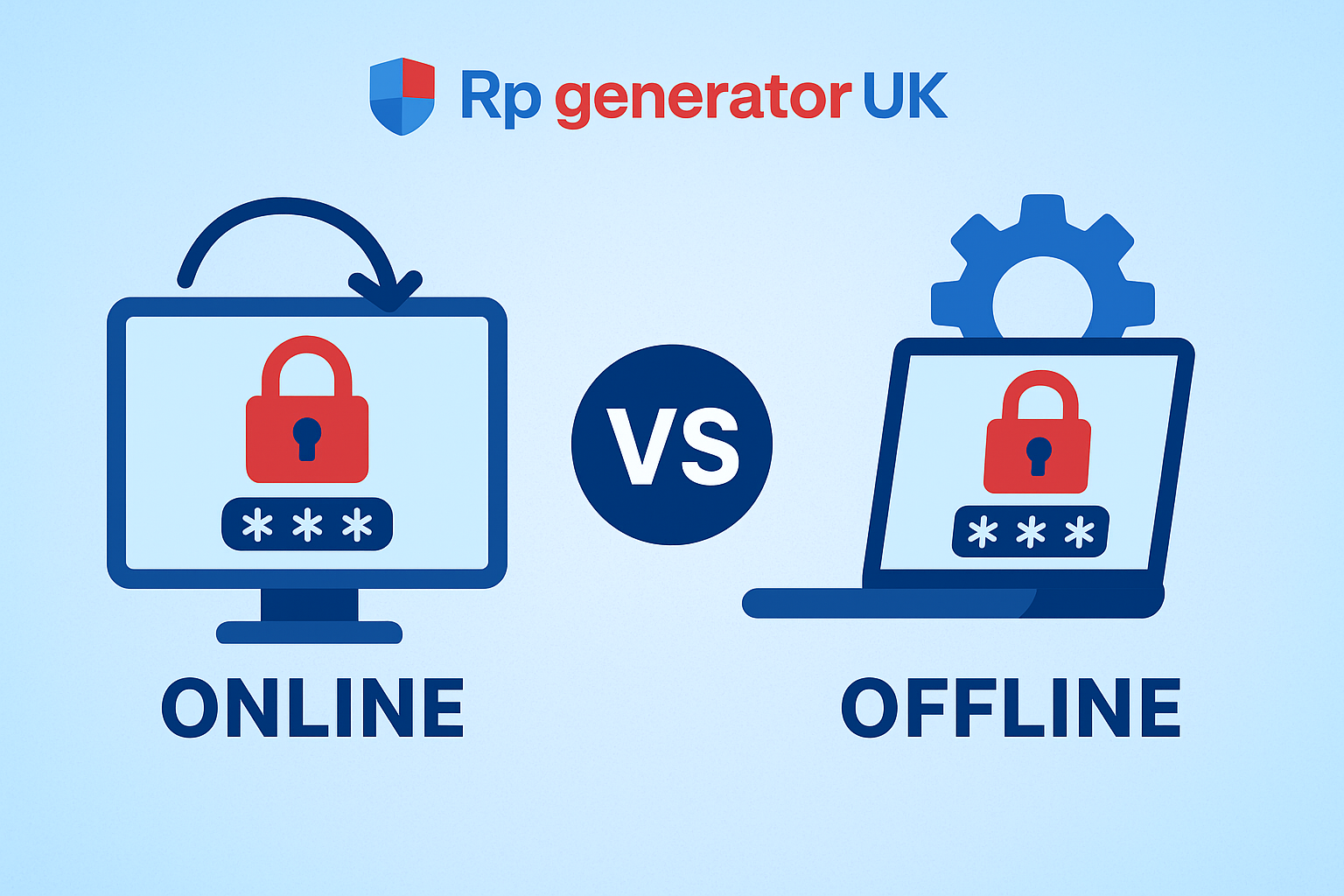Introduction
Is a random password generator safe to use? Many people ask this before trusting a tool that creates passwords for them. Today, almost everything in life is online. We log into social media, emails, banks, shopping sites, and even school apps. All of them need passwords.
The big problem is that people still use weak passwords like “123456” or “password.” Hackers know this and can break into accounts very fast. This is why random password generators are popular. They make strong, hard-to-guess passwords. But can you trust them? Are they safe? Let’s find out in very simple words.
What is a Random Password Generator?
A random password generator is a tool that makes a password for you. Instead of you writing “John2025,” it gives you something like “hT9@Lw8#Pz3.” It looks messy, but that is good because it is hard to crack.
There are two main types:
- Online password generators – You open a website and click “generate.” Example: McAfee Password Generator.
- Password manager generators – These are apps like Bitwarden or 1Password. They make and save your passwords for you.
Why use them? Because people are predictable. We use names, birthdays, or simple numbers. Hackers can guess those. A random generator makes something with no pattern. That’s why experts always say it is safer.
Why Password Security Matters in 2025
Passwords are like keys. If someone has your key, they can open your house. If someone has your password, they can open your accounts.
In 2025, online crime is at an all-time high. Hackers steal billions of dollars every year. One study by NordPass showed that millions of people still use “123456” as their password. No surprise—it gets hacked fast.
Here’s a short story:
A friend of mine used the same password “Emma1995” for Facebook, Gmail, and PayPal. One day, her Facebook account was hacked in a data leak. The hacker used the same password to get into Gmail and PayPal. She lost money and personal data. If she had used a random password generator, each account would have had its own password, and the hacker couldn’t use the same one everywhere.
This shows why password security is so important today.
Are Random Password Generators Safe?
The simple answer: Yes, they are safe if you use the right one.
Why? Because they create strong passwords with no pattern. A 16-character random password could take hackers thousands of years to guess, even with powerful computers.
But here’s the important part: not every generator is safe. If you use a random shady website, it may save the password and use it later. That is dangerous.
The safest choices are:
- Password managers like Bitwarden, 1Password, or LastPass.
- Trusted companies like McAfee or Avast.
If you use these, the password is only made for you, and nobody else sees it.
Risks You Need to Know
Even though generators are safe, there are a few risks:
- Untrusted websites – Some online tools might save the password you create.
- No HTTPS – If the website doesn’t have the lock sign in the address bar, your data can be stolen.
- Public Wi-Fi – Hackers can spy on you if you generate passwords in a café or airport.
- Copy-Paste danger – When you copy a password, some apps can read it. Password managers avoid this by saving directly.
So, is a random password generator safe to use? Yes—but only if you pick a trusted one and use it the right way.
How to Use a Password Generator Safely (Step by Step)
Follow these simple steps:
- Pick a trusted tool (McAfee, Bitwarden, Avast, or 1Password).
- Use long passwords—at least 14–16 characters.
- Always check that the website has HTTPS.
- Do not use generators on public Wi-Fi.
- Store passwords in a password manager, not in phone notes.
- Never reuse the same password on two accounts.
Do this, and you’ll stay safe.
Best Password Generators in 2025
Here are some trusted ones you can use today:
- McAfee Password Generator
- Bitwarden Password Generator
- Avast Random Password Generator
- 1Password Generator
- F-Secure Generator
All of these are safe, well-known, and trusted by millions of users.
Conclusion:
So, is a random password generator safe to use? Yes, it is—if you use trusted tools. They make passwords that hackers cannot guess, and they protect you from online attacks. The only danger is using untrusted websites or bad practices.
If you want the best safety, use a password manager with a built-in generator. That way, you get strong passwords and safe storage in one place. Don’t wait until your accounts are hacked—start using one today and protect your digital life.
FAQs – Is a Random Password Generator Safe to Use?
1. Is a random password generator safe to use?
Yes, it is safe if you use a trusted one.
2. Can a password generator be hacked?
Not really. The only danger is if you use a fake website.
3. Are online password generators safe?
Yes, but only on trusted websites with a lock sign (https).
4. What makes a password strong?
A strong password is long and has letters, numbers, and symbols.
5. Do websites keep the passwords they make?
Bad websites might. Always use trusted ones.
6. Is it better to make my own password?
No. People make easy ones. A generator makes harder ones.
7. Should I use the same password everywhere?
No. Use a different one for each account.
8. Where should I keep my passwords?
Keep them in a password manager app.
9. What if I forget my password?
A password manager can remember it for you.
10. Is copying and pasting safe?
It’s okay, but not the best way.
11. Are password manager generators better?
Yes. They make and save passwords safely.
12. Do generators make real random passwords?
Yes. They use special code to make them.
13. Can I use a generator on my phone?
Yes, if the app is trusted.
14. How do I know if a generator is safe?
Use one from a big, well-known company.
15. What is the best way to stay safe?
Use a trusted generator and a password manager.



